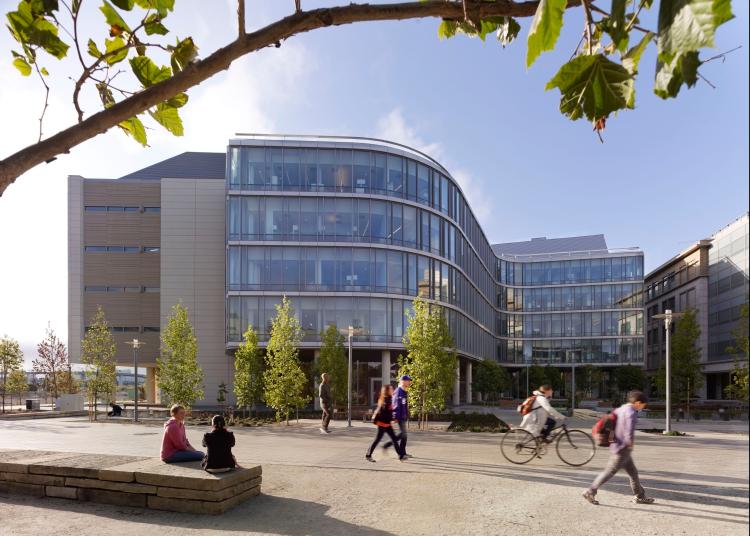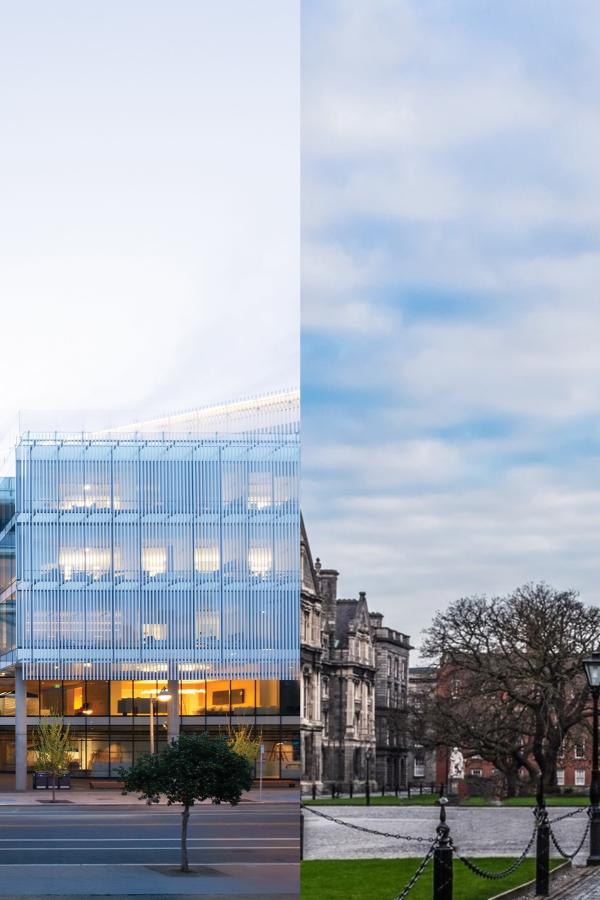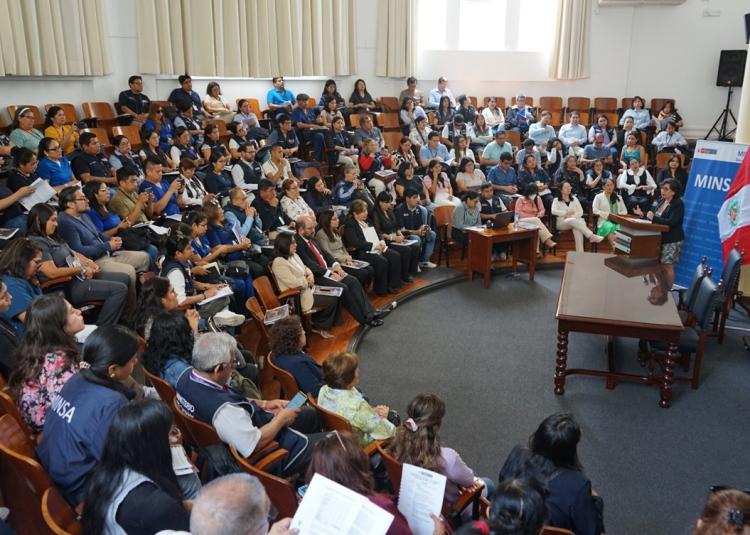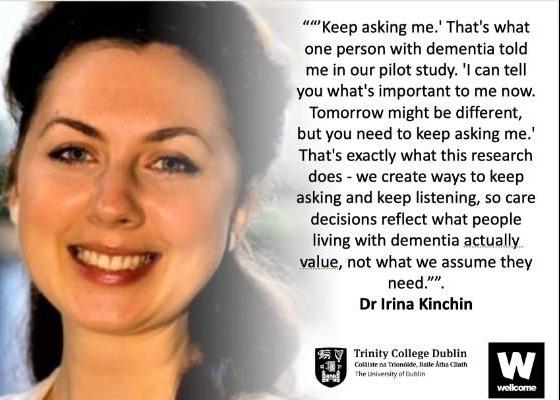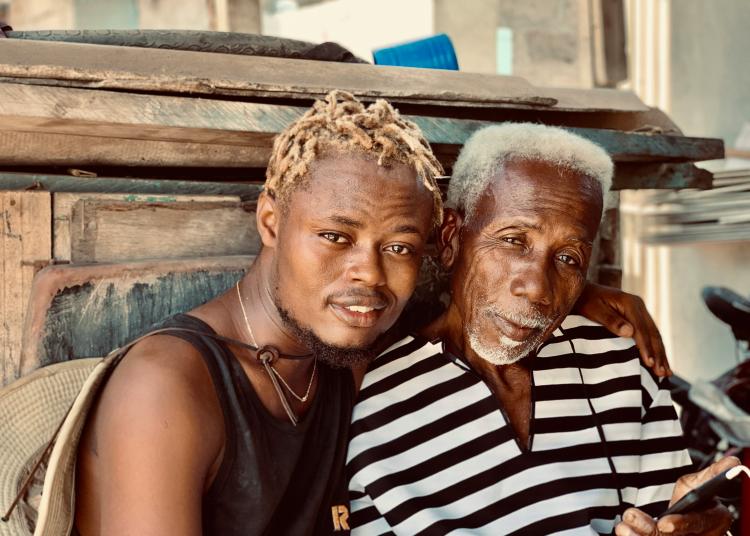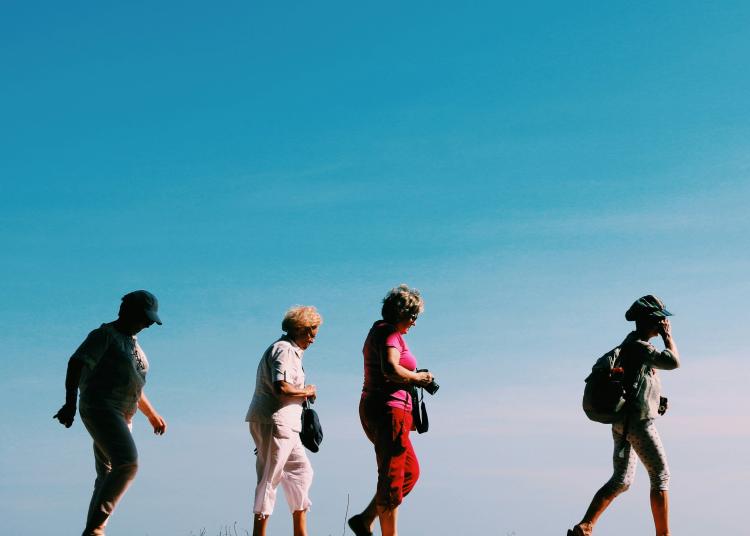Overview
GBHI’s two founding sites, University of California, San Francisco (UCSF) and Trinity College Dublin (Trinity), have formed a strong partnership based on shared values and vision. This values-based approach is what makes the collaboration successful—guiding each organization and unifying not only our goals but how we achieve them.
We share a common approach and program structure which is enriched by the unique aspects and expertise of each site and their wider ecosystem of collaborators, communities and partners. While much of the core Atlantic Fellows program at GBHI is a shared experience there are specific opportunities at UCSF and Trinity that may be aligned with your specific training and career goals. Applicants must select one site for the fellowship-year experience on the application. Read more about these opportunities below.
Important Note about GBHI at UCSF
Beginning with the 2026–27 fellowship year, GBHI at UCSF will launch a global hybrid program that combines online learning and mentorship with three in-person gatherings held in international locations and opportunities to spend time at UCSF. The fellowship at GBHI at Trinity will continue as an in-person program based in Dublin.
Certificate Award
Atlantic Fellows are eligible to register for a Certificate award from the host institutions of UCSF and Trinity, providing fellows with academic recognition of the work they undertake in the program.
Trinity
All fellows have the opportunity to register for a Trinity College Postgraduate Certificate in Equity in Brain Health as part of their fellowship.
UCSF
All fellows have the opportunity to register for a UCSF Certificate in Equity in Brain Health as part of their fellowship.
Differences in Program Requirements
Applicants should complete the highest degree and associated training they wish to obtain in their particular field. Applicants from all disciplines and professional backgrounds are encouraged to apply. Applicants should have a strong foundation of experience and expertise and be ready to advance meaningful and impactful work.
Those not meeting the minimum criteria may still be eligible for the Atlantic Fellow program but would not receive the certificate. Applicants who may not have the necessary academic requirements (i.e qualifications) for the Certificate may still be eligible to apply to the Atlantic Fellows program.
Trinity
For the Certificate program a minimum of a bachelor’s degree is required. In certain cases where fellows do not have a prior qualification, they may be able to register based on recognition of prior learning and experience (RPL). Please note that registration for the Certificate is not a requirement for the fellowship at Trinity.
UCSF
For Certificate Program: minimum of a bachelor’s degree, 3.0 GPA, official transcripts needed (upon acceptance to the program).
Opportunities for Research (Trinity)
Both UCSF and Trinity emerge from an outstanding foundation of basic and clinical neuroscience, aging, and dementia research with a clear emphasis that science must make a difference to society.
Trinity
Research is at the heart of Trinity and plays a key role in establishing the institution as Ireland’s leading university, with a distinguished international academic reputation. Fellows will have the opportunity to explore a diverse range of brain health topics. Key faculty research themes and examples of specific projects are outlined below:
Predictive Modelling, Technology and Data Science
Clinical Trials in Dementia
Lifecourse Brain Health and Risk Factors
- PREVENT Dublin
- Loneliness
- Fetal Alcohol Spectrum disorder (FASD), alcohol and the brain.
Neuroimaging, Neuromodulation and Monitoring
- Novel EEG applications
- Non-invasive neurostimulation
- Applied neural engineering for brain health
Health Economics of Brain Health and Dementia
Opportunities for Research (UCSF)
Both UCSF and Trinity emerge from an outstanding foundation of basic and clinical neuroscience, aging, and dementia with a clear emphasis that science must make a difference to society.
UCSF
As an academic institution and an NIH-funded Alzheimer’s Disease Center, the UCSF Memory and Aging Center is developing world-class research. Fellows will have the opportunity to research a wide variety of dementia and brain heath related topics, including:
- Mild cognitive impairment | Alzheimer’s disease | Frontotemporal Spectrum Disorders (FTD, PPA, CBS, PSP) | Huntington’s disease or Spinocerebellar Ataxia | Prion Disease or Other Rapidly Progressive Dementias (RPDs) | Parkinson’s & Lewy Body Disease | Children and Young Adults with Families with Neurodegenerative Disease | Chinese-speaking populations | Spanish-speaking populations
Fellows can engage in research with the more than 40 Memory and Aging Center faculty. Many of the active research protocols can be found here. Fellows also have the opportunity to engage in research across other departments at UCSF as well as some of the following resources:
- The Neurodegenerative Disease Brain Bank (NDBB) serves as a repository for nervous system tissue donated for research purposes.
- The Dementia Care Pathway is a suite of tools and educational materials designed to improve the ability of non-specialists to more effectively diagnose and treat dementia.
- The Care Ecosystem is a model of dementia care designed to provide personalized, cost-efficient care for persons with dementia and their caregivers.
- TabCAT and EXAMINER are computer- and tablet-based cognitive tests designed for use in clinical research studies.
- The Center for Population Brain Health investigates Risk and Resilience Factors for cognitive aging and dementia, especially with the goal of identifying opportunities for prevention.
- The Rabinovici Lab leads the PET program at the MAC, applying novel PET tracers along with structural and functional MRI to a broad spectrum of neurodegenerative diseases.
- AFRICOS is a longitudinal assessment of cognition and mental health among people with HIV in East Africa and Nigeria (faculty lead: Victor Valcour).
- With data on cognition, MRI, biomarkers, genetics, and risk/resilience factor, CARDIA Cognition is an NIA-funded project investigating the determinants of cognitive and brain health in Black and White adults across the life course (faculty lead: Kristine Yaffe).
- The Health & Aging Brain Study focuses on understanding the biological, social and environmental drivers of brain health disparities in a diverse cohort of Mexican American, non-Hispanic White, and African American older adults (faculty lead: Kristine Yaffe)
- ReDLat fosters a consortium whose goal is to expand dementia research in Latin America and the Caribbean (LAC) to combine genomic, neuroimaging and behavioral data to improve dementia characterization and identify novel inroads to treat neurodegeneration in diverse populations.
- The Yokoyama Lab Data Science Interest Group includes members of the Yokoyama Lab and other colleagues from UCSF who meet weekly to discuss on-going challenges and opportunities in data science using real-world examples they encounter in their research (Contact: Alexis Oddi).
- The Neurobiological Basis of Sleep Disruption in Alzheimer Disease is a study led by the Grinberg Lab in which neuropathological methods are used in post mortem human tissue to understand which brain changes associate with sleep disruption.
Opportunities for Clinical and Lived Experiences
Throughout the year, Atlantic Fellows have opportunities to observe in a range of clinical and community-based settings. These observations help them to develop a better understanding of clinical practice and dementia care and gain an appreciation and understanding of the lived experience of people with dementia and their families.
Trinity
Personalised opportunities to observe services in health and social care services serving diverse communities in Dublin City:
Opportunities include:
- Mercers Institute for Successful Aging (MISA)
- Dementia Services Information and Development Centre DSiDC
- National Intellectual Disability Memory Service
- Community-based experiences
Clinical and Lived Experiences (CLE) case discussions and seminars led by CLE faculty leads and fellows.
UCSF
Clinical and Lived Experiences at the UCSF create opportunities for fellows to experience first-hand how clinicians diagnose various brain-related conditions, how researchers develop tools to investigate questions surrounding brain function and disease, and how community interventions impact patient and family outcomes.
For Core Rotations, fellows complete an extensive program of nine one-month-long assignments that include two to eight hours per week of observational opportunities:
- Memory and Aging Center (MAC) Clinic
- Alzheimer’s Disease Research Center (ADRC)
- Frontotemporal Dementia program project grant (PPG)
- Community outreach clinics
- Zuckerberg San Francisco General Hospital (ZSFG)
- ALBA Language Neurobiology Laboratory
Elective Rotations
Artistic Initiatives
Arts and creativity are key to enhancing brain health throughout our lives, and artists help us to understand and communicate complex and challenging concepts and issues in new ways. GBHI embraces art and creativity to improve our understanding of brain health and dementia, and to lead change in practice, perception, and policy.
Trinity
- Fellows can participate in Creative Brain Week. Led by GBHI at Trinity, this annual event explores of how brain science and creativity collide to seed new ideas in social development, culture, wellbeing, and physical, mental and brain health across the life cycle and within society.
- Fellows will also be able to participate in a series of arts and creativity-based workshops and experiences delivered with our institutional and community partners, including IMMA and the Abbey theatre..
UCSF
- Fellows are invited to participate in Creative Minds, the San Francisco community arts for brain health initiative. Fellows are also eligible to apply for a creative project grants to support an arts-based initiative during their fellowship year.
- The San Francisco Conservatory of Music (SFCM), GBHI and the UCSF Memory and Aging Center joined forces in 2019 to explore the intersection of music, creativity, and brain science. Through this innovative collaboration, we work together to produce an annual series of public-facing educational programming.
- For decades, doctors have noticed a rare burst of visual creativity that occurs among a small number of patients with dementia. A collaboration of 27 scientists led by UCSF—including Atlantic Fellows and GBHI faculty—has offered new insights into how this talent develops as key areas of the brain degenerate.
- The unique Hellman Artist in Residence Program was created to foster dialogue between scientists, caregivers, patients, clinicians, artists and the public regarding creativity and the brain.
- Other opportunities include Gallery 190, a rotating art exhibition space within the Memory and Aging Center offices, and the MAC Band, a musical group comprised of UCSF MAC faculty, staff and fellows that regularly rehearses and performs on campus.
Faculty Mentors
With leading expertise and global networks, the GBHI faculty mentors can fully immerse Atlantic Fellows in a dynamic learning environment with unique opportunities for professional collaboration and growth.
Trinity
- Claire Gillan: computational psychiatry, mental health, citizen science
- Agustín Ibáñez: leads multicentric research that addresses environmental factors, including social and physical exposomes, and their interactions with biological processes in aging and dementia across diverse populations
- Nicholas Johnson: how theatre laboratory work can generate new knowledge for more interdisciplinary contexts in a wide range of fields
- Brian Lawlor: dementia, diagnosis and care, loneliness, depression in older people
- Iracema Leroi: dementia trials, sensory cognitive impairment, Public Patient Involvement (PPI), Lewy Body Dementia
- Alejandro Lopez: digital brain health, neural engineering
- Eimear McGlinchey: the promotion and maintenance of brain health in people with an intellectual disability, with particular focus on the area of dementia in people with Down syndrome
- Lorina Naci: neuroimaging, consciousness, mid life risk factors for brain health
- Roman Romero-Ortuno: frailty, geriatrics
- Katy Tobin: population health, biostatistics, fetal alcohol syndrome
- Dominic Trépel: health economics of dementia, brain health antenatal health
- Sven Vanneste: neuromodulation, tinnitus and brain health
- Robert Whelan: computational neuroscience, EEG, neuroimaging, machine learning
UCSF
- Aaron Berkowitz: neurology care and education in resource-limited settings
- Bruce Miller: frontotemporal dementia, behavioral neurology
- Charles Windon: biomarkers, disparities
- Howie Rosen: frontotemporal dementia, neuroimaging
- Jennifer Yokoyama: neurogenetics, research in diverse populations
- Jim Kahn: health economics, global health
- Joel Kramer: neuropsychology, longitudinal effects of aging on cognition
- Kate Possin: cognitive assessment, caregiving
- Kate Rankin: neuropsychology, social behavior
- Kristine Yaffe: epidemiology, dementia prevention
- Lea Grinberg: neuropathology, neurodegenerative diseases
- Marilu Gorno-Tempini: dyslexia, primary progressive aphasia
- Michael Geschwind: rapidly progressive dementias, movement disorders
- Renaud La Joie: imaging
- Serggio Lanata: behavioral neurology, community outreach
- Suzee Lee: preclinical and early stage genetic neurodegenerative diseases, neuroimaging
- Victor Valcour: HIV, professional education
- Virginia Sturm: emotion, neurodegenerative diseases, affective neuroscience
Community Outreach
Atlantic Fellows participate in various Community Outreach opportunities dedicated to improving the quality of health care for communities facing barriers to brain health.
Trinity
One of GBHI's key community partnerships is with Respond a not-for-profit approved housing body, which plays a central role in providing homes and supporting communities around Ireland. Respond also provide a range of services, including family homeless support services, day care services for older people, early childhood care and education, family support, and refugee resettlement services .
This partnership aims to examine our understanding of brain health and how it can be applied to housing design and to the provision and the development of sustainable communities. This approach addresses social justice and equity, reflects both the core mission and identity of both Respond and GBHI.
Fellows have the opportunity to engage with this project in a number of ways, including the developing Brain Healthy Village project.
UCSF
Through the UCSF Memory and Aging Center, Atlantic Fellows join multilingual and multicultural teams (English, Spanish, Cantonese, Mandarin, Tagalog) for Community Outreach and Engagement opportunities. All of our services aim to be culturally appropriate. We are supported by a multidisciplinary team with experience in neurodegenerative diseases, the arts, and community engagement.
Our community outreach and engagement efforts are centered on four specific goals: 1) To extend neurological clinical services to vulnerable populations at community-based clinics and at the Memory and Aging Center; 2) Promote diversity in research by conducting outreach in neighborhoods historically less engaged in MAC research projects; 3) Improve brain health literacy through community-based education; and 4) Support healthy cognitive aging through arts and activity-based community engagement.
Partner organizations include:
- Chinatown Public Health Center
- Zuckerberg San Francisco General Hospital and Trauma Center (Neuro-Geriatrics)
- Mission Neighborhood Resource Center
- Bayview Senior Services
Equity Awards
- GBHI supports annual Equity Awards to catalyze innovative research or the implementation of projects related to brain health in communities facing barriers to health and opportunity.
- To date, awarded research and projects have focused on issues of homelessness, dementia assessment in diverse populations, the impact of socioeconomic status on brain health; the engagement of underrepresented populations in clinical practice and research; increasing diversity in autopsies for neurodegenerative research; and validating testing of cognitive health in diverse populations.
Partnerships
GBHI partners and collaborators offer specific resources and opportunities to advance our shared goals to prevent dementia and protect brain health. Though most of our partners work across sites, several have close relations based on their location.
Trinity
- Respond and GBHI Trinity have been collaborating in the field of brain health and housing, developing scalable community based approaches to protect brain health.
- Irish Museum of Modern Art (IMMA); Ireland's primary public modern and contemporary arts museum, and a leader in the research & practice of dementia inclusive programming and arts for wellbeing.
- Brain Health Scotland
UCSF
- The San Francisco Conservatory of Music (SFCM), GBHI and the UCSF Memory and Aging Center joined forces in 2019 to explore the intersection of music, creativity, and brain science. Through this innovative collaboration, we work together to produce an annual series of public-facing educational programming.
- The Mission Neighborhood Health Center provides compassionate, patient-centered care and advocates for health equity and delivery of innovative, high quality services responsive to the neighborhoods and diverse communities of San Francisco.
- The San Francisco VA Health Care System aims to honor Veterans, their families, and caregivers by offering exceptional care that improves their health and well-being. For over 60 years, the Medical Center's affiliation with the University of California, San Francisco (UCSF) ensures that all physicians are jointly recruited with UCSF School of Medicine.
Trinity College Dublin
Founded in 1592, Trinity is Ireland’s oldest university and today has a vibrant community of 17,000 students. It is recognized internationally as Ireland’s premier university. Cutting edge research, technology, and innovation places the university at the forefront of higher education in Ireland and globally. It encompasses all major academic disciplines and is committed to world-class teaching and research across the arts, humanities, engineering, science, social, and health sciences. Its historic campus is situated in the center of Dublin, Ireland’s capital city.
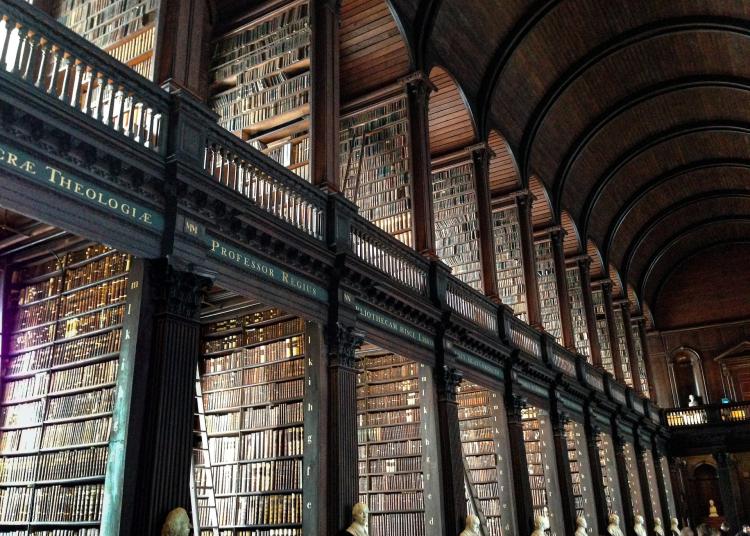
University of California, San Francisco
UCSF is a leading university dedicated to promoting health worldwide through advanced biomedical research, graduate-level education in the life sciences and health professions, and excellence in patient care. It includes top-ranked graduate schools of dentistry, medicine, nursing, and pharmacy, a graduate division with nationally renowned programs in basic, biomedical, translational, and population sciences, as well as a preeminent biomedical research enterprise and two top-ranked hospitals, UCSF Health and UCSF Benioff Children’s Hospital San Francisco.
